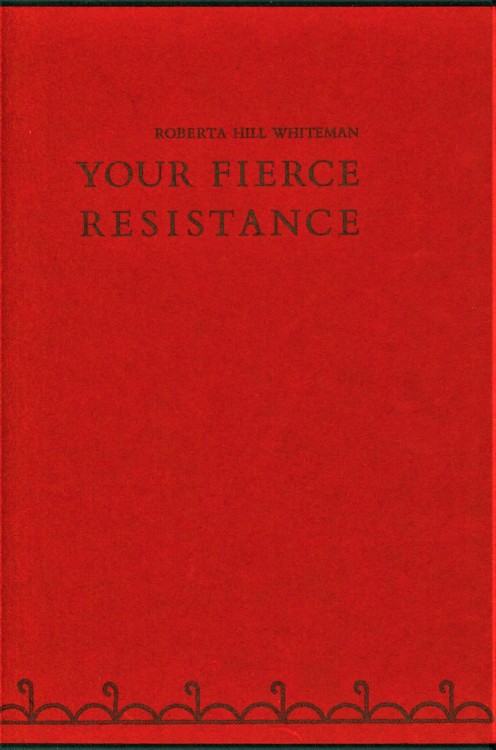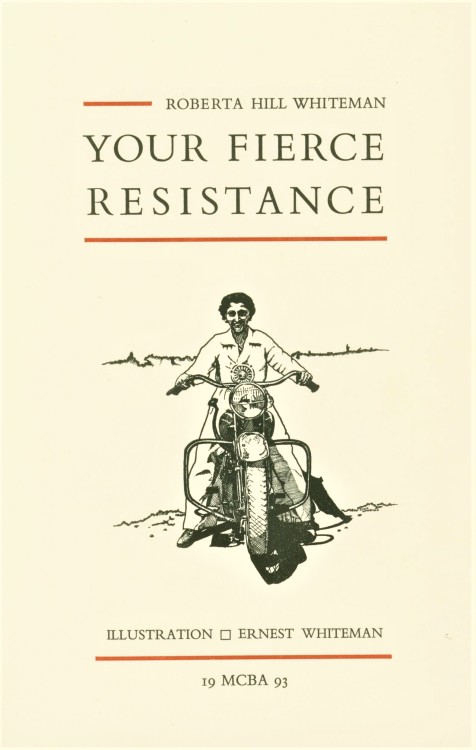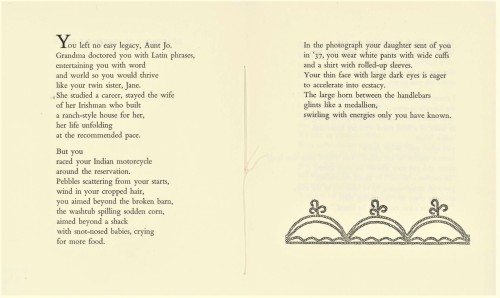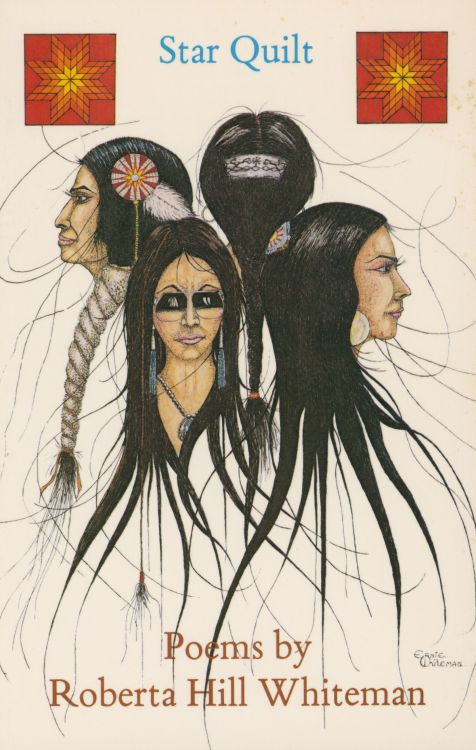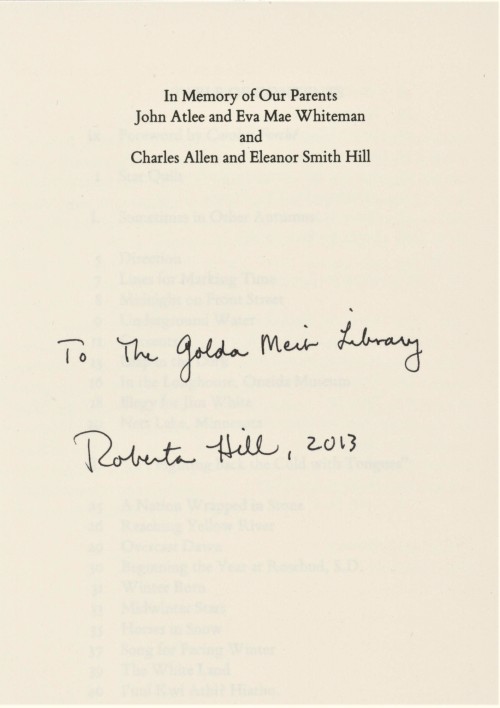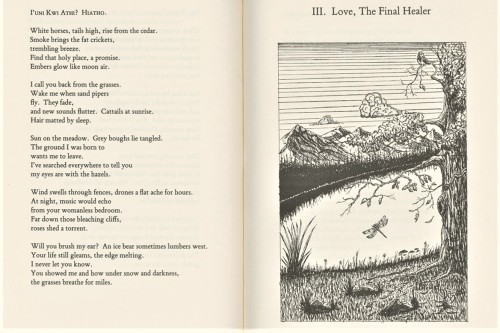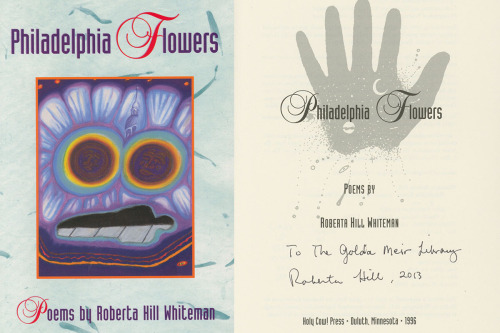#your fierce resistance
First Nations Fine Press Friday
Roberta Hill
In association with our post this weekonRoberta Hill, we present the fine press printing of an excerpt from Hill’s 1993 poem, Your Fierce Resistance. Printed in an edition of 150 copies at the Minnesota Center For Book Arts (MCBA) in conjunction with literary center The Loft for theInroads: Writers of Colorseries,Your Fierce Resistance is an excerpt of a longer poem of the same title. The full-length poem can be found in Roberta J. Hill’s (then, Roberta Hill Whiteman) second poetry book collection, Philadelphia Flowers: Poems, published by the Holy Cow! Press in 1996. The edition was was printed by Robert Johnson of the Melia Press and wood engraver, printer, designer, poet, and illustrator Gaylord Schanilecusing Bembo type on Mohawk Superfine paper, with Fabriano Italia endsheets and Moriki Over Arches covers, supported in part by a grant from the National Endowment for the Arts.
Hill completed her PhD with a biographical study of her paternal grandmother, Dr. Lillie Rosa Minoka-Hill—the second American Indian woman to earn an M.D. in the United States. Minoka was ofMohawk descent, but had moved with her husband to the Wisconsin Oneida Reservation where she opened a “kitchen clinic” to serve the Oneida peoples. She’s said to have been adopted by the Oneida Nation of Wisconsin—the only person in the 20th century to be officially adopted by them—and was given the name Yo-da-gent, meaning “she who saves” or “she who carries help”.
The book, however is dedicated to another family member, Josephine Coté, Hull’s matrilineal aunt. Nonconformity must run in the women of this family, as Hill’s writing honors her aunt’s outward resistance to all pressures of assimilatory expectations, both inside and outside the Oneida reservation. Hill recalls a conversation with Coté, in Your Fierce Resistance,
Then
you asked me, “What passes
from a mother to her child?” You shifted your thin body
closer and put your elbows on your knees.
“Its mother’s blood. The blood remembers,”
you said, straightening up to look me in the eyes,
snapping them in your teasing way.
“Whatever’s lost can often be found.”
Roberta Hill’s three poetry collections revolve around the communal feeling of disconnection within the Oneida Nation’s people, where she utilizes nature-centric Native American/First Nations ideals to take a firm stance against the capitalistic consumption polluting our environment. Hill has read her poems throughout the United States and at International Poetry Festivals in Medellin, Columbia and Poesia Do Mundo in Coimbra, Portugal, as well as in China, Australia, and New Zealand. Hill has retired from her position as a Professor of English and American Indian Studies, affiliated with the Nelson Institute for Environmental Studies, in May of 2020, and now lives in the Driftless area of Wisconsin.
View moreFine Press Friday posts.
–Isabelle, Special Collections Undergraduate Writing Intern
We acknowledge that in Milwaukee we live and work on traditional Potawatomi, Ho-Chunk, and Menominee homelands along the southwest shores of Michigami, part of North America’s largest system of freshwater lakes, where the Milwaukee, Menominee, and Kinnickinnic rivers meet and the people of Wisconsin’s sovereign Anishinaabe, Ho-Chunk, Menominee, Oneida, and Mohican nations remain present.
Post link
Native American/First Nations Woman Writer of the Week
ROBERTA HILL
This week, we introduce you all to Roberta Jean Hill, formerly Roberta Hill Whiteman, a poet and educator native to Wisconsin! Born in 1947 near Green Bay, Roberta Hill grew up among the Oneida Indigenous peoples of Wisconsin, a rich heritage that enlightens her work as a poet and has driven her scholastic career. In her third poetry collection, Cicadas: New & Selected Poems, published by the Holy Cow! Press in 2013, Hill writes:
To the people, beings and places I love, named or unnamed, met and imagined. May they continue to inspire us to live and keep loving earth and her beings for all eternity.
UW-Milwaukee Special Collections preserves four signed presentation copies of Hill’s poetry books, all published by Jim Pearlman, founder and editor of Holy Cow! Press in Duluth, Minnesota, which is dedicated to publishing writers who live in the American Midwest and focuses on publishing Native American authors and thematic anthologies.
UWM Special Collections holds two copies of Hill’s first collection of poetry,Star Quilt, originally published in 1984 with foreword by poet, editor, professor, translator, and human rights advocate,Carolyn Forché. One is a first printing from 1984, signed in 2013 to our library, while the other is a second printing, illustrated and republished by the Holy Cow! Press in 1985, which is signed to Milwaukee poet and educator DeWitt Clinton.
The illustrations for both printings of Star Quilt were done by Hill’s husband, artist, director of First Nations Film and Video Festival, Inc, and member of theNorthernArapaho tribe,Ernest Whiteman. The cover art for the book is a portrait of a woman facing four ways, hinting at Roberta’s use of the four cardinal directions throughout the book that portray the separation and displacement that the Oneida peoples have experienced in a long history of forced migration by the U.S. government. Throughout the collection, Hill internalizes this feeling of loss and separation, utilizing an extended metaphor of dust in the winds returning to the Earth, from where the peoples are said to have come. The poem above, “I’uni Kwi Athi? Hiatho,” uses Hill’s father’s name, the meaning of which Hill says he never revealed.
In the glossary for Star Quilt, Hill tells the history of quilt making by Plains Indian women, which are designed with a central star for their children and grandchildren, stating, “it is a valuable possession, connecting the generations to one another and the earth.” Hill dedicates this collection to those who inspired her writing, “In Memory of Our Parents John Atlee and Eva Mae Whiteman and Charles Allen and Eleanor Smith Hill”.
Roberta Hill’s second collection, Philadelphia Flowers: Poems, published in 1996, carries many individual poems to and for family and friends, dedicating the collection to her three children, Jacob, Heather, and Melissa. The cover painting and illustrations for Philadelphia Flowers are again by Ernest Whiteman. Hill’s final and most recent collection, published in 2013, Cicadas: New & Selected Poems, reprints poems selected from Star QuiltandPhiladelphia Flowers and acts as a follow-up to her recent life experiences; including a longer individual poem dedicated to Hill’s late brother-in-law, “Ernie” Whiteman.
Also held by our department is a fine press printing of an excerpt of Roberta Hill’s poem, Your Fierce Resistance, published in 1993 by the Minnesota Center For Book Arts in conjunction with The Loft’sInroads: Writers of Color series. Be on the lookout for more on this beautiful production coming later!
After graduating with a BA from the University of Wisconsin-Green Bay, Hill earned an MA in fine arts from the University of Montana, and completed her PhD in American Indian Studies at the University of Minnesota. Hill’s doctoral thesis honors the work of her paternal grandmother,Dr. Lillie Rosa Minoka-Hill, through a biographical study of her life as the second American Indian woman to earn an M.D.in the U.S. Roberta Hill has held several academic positions and is Professor Emerita of English and American Indian Studies at the University of Wisconsin-Madison.
See other writers we have featured in Native American/First Nations Woman Writer of the Week.
–Isabelle, Special Collections Undergraduate Writing Intern
We acknowledge that in Milwaukee we live and work on traditional Potawatomi, Ho-Chunk, and Menominee homelands along the southwest shores of Michigami, part of North America’s largest system of freshwater lakes, where the Milwaukee, Menominee, and Kinnickinnic rivers meet and the people of Wisconsin’s sovereign Anishinaabe, Ho-Chunk, Menominee, Oneida, and Mohican nations remain present.
Author Portrait from the Library of Congress
Post link

